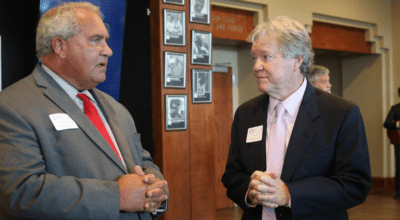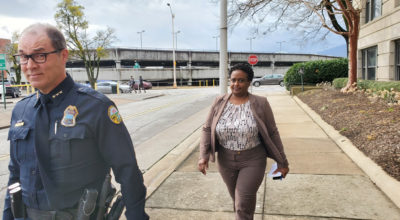



CHATTANOOGA, Tenn., Feb. 22, 2022 — At the city council meeting in Chattanooga on Feb. 20, 2018, I handed members an analysis of state and federal law that points out a grievous wrong city government has imposed for decades on inhabitants and visitors.
And that is the traffic stop — an imposition of the state’s shipping, freight and transportation statute upon people who are not involved in freight, shipping or transportation. My 4-year-old document (publicly recorded in Rhea County and given notorious publication by legal notice in Hamilton County) is a restatement of Tennessee law. It effectively orders the city to obey state and federal law respecting the limits of the law.
1st of 3 parts
And in so doing it must halt most traffic stops against private, noncommercial users of the public right of way — an unquestioned system of harassment that affects minorities and the poor the most.
Among those to whom I handed my transportation administrative notice are African-American councilwoman Demetrus Coonrod who was a car guest in a June 2017 traffic stop over a missing tag light and councilman Anthony Byrd who says he has endured many cop encounters — “20, 30, 40 —more than I can count,” often while traveling by car while black.
Serving notice to one Southeast Tennessee city is the beginning of a legal reform project with a lococentric perspective and an incremental approach to curbing the local manifestation of a national problem: Abusive police traffic enforcement outside the scope of black-letter law.
The project does not count on courts, mayors, governors or important people to do anything or make any commitments, though support and reforms from on high are called for.
My approach is locally empowering and self-directing, as Bruce Katz outlines in his book, The New Localism; How Cities Can Thrive in the Age of Populism (2017). It’s populist because its strongest appeal is to the mass, not the elite. I believe the reform will come into effect through many small gains and small commitments by citizens, individual cops and finally by chiefs of police.
Haven from customary cop work
A reform will create a sanctuary city that even conservatives could love, a city of refuge from rogue state actors. A change in police activity will benefit the people economically, culturally and spiritually, I argue, because it will reduce a continuing drag on the lives of the poor — that is, legal entanglements that easily debilitate people on the margins and keep the county jail downtown full, mostly of people too lacking to make bond.
Of particular concern are African-Americans, Spanish-speaking immigrants, illegal aliens, the myriad poor and also those in a biblical category, “orphans and widows,” who deserve special protection by governments and police departments. These categories of people are most damaged by traffic stops.
Citizens benefit. Police professionals gain. A limited and proper enforcement of traffic laws also seeks to reduce legal liability for police officers and sheriff’s deputies who are forbidden by law to oppress people and act under color of law.
It spares them the most dangerous type of public encounter. According to a National Law Enforcement Officers Memorial Fund study, traffic stops are more dangerous to officers’ life and health than domestic dispute calls. (See pp. 38-42.)
The problem in Tennessee is mirrored in every state in the Union, thanks to homogenizing work of groups such as the Uniform Law Commission. Probably 95 percent of content and definitions in these laws are identical among the states. What I do toward reform in my state is perhaps replicable in yours.
I am a former newspaperman, having worked at the Chattanooga Times Free Press as a copy editor for 24 years and after that publishing legal and economic commentary as “the blogger with the biggest pen” in Chattanooga. I’ve been in the talk radio business as investigative reporter and host 10 years and run NoogaRadio 96.9 FM similar to this law blog.
My legal notice is based on a thorough reading of Tennessee Code Ann. § Title 55 on motor and other vehicles, Title 65 on carriers, and also U.S. Code § Title 49, the federal transportation law. My summation of laws and all relevant court cases comes together into 20 pages, served personally on local authorities, filed as an affidavit in the public record of nearby Rhea County and put in the local newspaper legal classifieds to give the notice a legally unassailable existence.
I have a long history of dealing with these laws. In 1999, I demanded renewal of a driver license from the department of safety under then-Gov. Don Sundquist, but was denied because I no longer had a social security number, having availed myself of the common law remedy of rescission of contract for fraud.
A court fight over my demand ended with a negative ruling in the Tennessee court of appeals. Meanwhile, the general assembly rewrote a perfectly clear driver license application statute to account for my arguments about not having a social security number. The revised statute has proven a boon to Hispanic immigrants and to conscientious objectors to social security numbers. Today, one simply has to sign an affidavit stating that one has not been issued an SSN, and one can get a driver’s license using other ID.
Transportation vs. travel
All early court cases and the language of the statute from its very beginnings tell of the state’s interest to regulate commercial use of the roads. Our statute makes a distinction very clear between the main category of movement on the roads —aka travel — and the subcategory, transportation.
What is transportation? What is freight? What is shipping? I have asked many lawyers this question and the answer is universally unsatisfactory. Transportation is the moving of goods or people for hire, for private gain and profit. Court cases emphasize that commercial use of the public infrastructure is an “extraordinary use.” The state interest is in public health, safety and welfare. The state regulates commerce because profit-seeking entrepreneurs put wear and tear public infrastructure, and raise risks for others in their movement of rigs, trailers and heavy loads. The subject parties are dump trucks, ambulances, taxis, wrecker services, movers, 18-wheel tractor-trailer rigs and the like carrying everything from sick people to lumber to imported TVs heading to the local Wal-Mart.
But there are limits to commercial transportation laws.
The state has no authority whatsoever to intervene against the rights of the people. By definition, a right is free from any tax or permit. A right is distinct from a taxable privilege. In my state inhabitants are described as a free people, and we are protected by what the constitution calls “a free state.” That is, a state not controlled or bound by private interests (such as the lawyer guild or insurance companies).
Our bill of rights guarantees many liberties. The law and the court cases in my notice describe the private use of the road as being for pleasure and private purposes. The state has no authority to hold any private user of the road to account for anything absent a clear risk to the public or an accident (nuisance or tort). Common law rights to movement are not, and have never been, made to vanish under claims of administrative law.
Administrative law regulates parties who enter into an equitable and legal relationship with the state by application and the payment of fees so they might exercise state privileges. These licensor-licensee relationships are in the administrative realm. Common-law rights are not subject to administrative law. “The claim and exercise of a constitutional right cannot *** be converted into a crime” Miller v. U.S. 230 F. 2d. 486 (1956) and a famous quote in the Miranda ruling insists rulemaking cannot abrogate a constitutional right.
Private users of the road are not exercising a privilege, nor need they apply for a state favor. They are not required to pay any tax for the privilege of “operating a motor vehicle.” All they’re doing is traveling by private conveyance and not affecting the public interest by being in the stream of commerce.

Activist courts blight ancient right
But we have a problem in Tennessee. Its people suffer from an activist judiciary serving private and corporate interests. There is a disjointure between clear and liberal statute on one side and law enforcement practice on the other.
In all 95 Tennessee counties, traffic stops against private users are upheld by the courts The constitutionalist or right-to-travel line of appeals is repeatedly rejected, most recently in State of Tennessee v. Arthur J. Hirsch (M2016-00321-CCA-R3-CD).
Is it true that there is no such thing as travel in Tennessee? Apparently not. The courts’ position is a legal fiction, a phenomenon discussed in esoteric legal treatises. Neal Pinkston, the state’s attorney in Hamilton county, assures me that there is no right to travel apart from the changing of domicile from one state to the other.
So how can I make my city a welcoming place, a freer place, a less oppressive place?
The rights of the people are clear in the constitution. The statute does not damage the rights of the people. But police departments, sheriffs and the Tennessee department of safety, in complicity with the courts, pretend that the people do not have a right to movement of their private persons and effects.
➤ Gov. Bill Lee pretends that to exercise the so-called right to vote, local African-Americans such as hiphop artist Cameron “C-Crimey” Williams must first get the state’s OK to get into a sedan to go the polling place or an artistic venue.
➤ My local sheriff, Jim Hammond, pretends that for a woman to go for an abortion, which in Tennessee is her constitutional right, she must get the state’s permission to get into her pickup truck and go to Nashville with her boyfriend to get rid of an unwanted child.
➤ Chattanooga’s former police chief David Roddy pretended that local gun rights activist Ben Brandon cannot exercise his constitutional right to bear arms and that he must convert his private automobile into a motor vehicle so that he might go upon the highway in commerce to his shooting range or lecturn.
What to do?
Next: Activist journalist uses public notice about state law to leverage compliance by police and sheriff’s departments despite decades of control by judicial policy that rejects free egress and ingress from cities and counties. https://tnt23.wpengine.com/2022/02/bully-administrative-notice-puts-cops-on-spot-goads-cities-to-be-open-ii/
David Tulis runs NoogaRadio 96.9 FM and is editor of TNtrafficticket.us, covering local economy in Chattanooga and beyond. He is not an attorney and does not give legal advice; for that, consult an attorney licensed to practice in your state or on another planet, where the law may indeed matter. He hosts a marketplace show two hours weekdays 2 p.m. live at NoogaRadio.com and also live on Facebook at NoogaRadio. He is married and the father of four homeschooled children.
Tennessee Transportation Administrative Notice as PDF
Read Parts II and III
This 20-page legal notice lets you fight back vs. illicit ‘traffic stops’ — sue for damages, have defense in your criminal case
Donate to help David Tulis in court case for liberty

